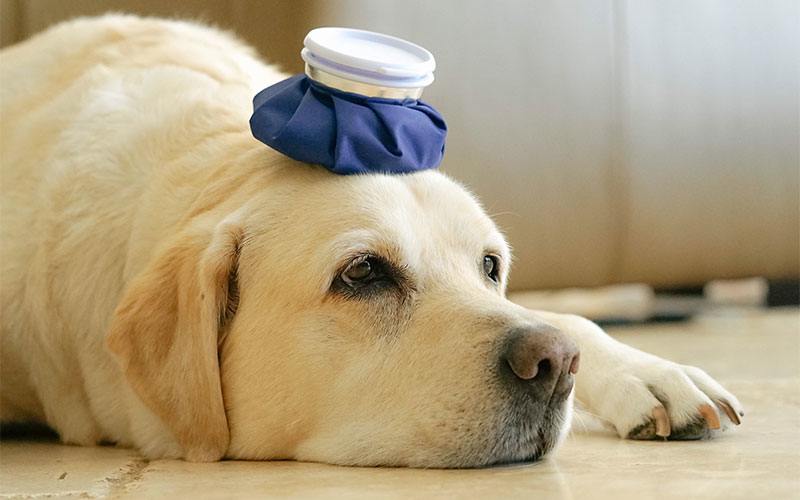Dogs are known for their loyalty, companionship, and their ability to make us feel better when we're down. However, many pet owners wonder if their furry friends can catch colds from humans. The answer is not as straightforward as one might think.

While dogs can contract respiratory infections, the viruses and bacteria that cause them are typically different from those that affect humans. This means that dogs cannot catch colds from humans in the same way that humans can. However, dogs can still catch colds from other dogs or animals, and they can also catch different strains of the same virus that humans have.
Can Dogs Catch Colds from Humans?
Dogs are known to be loyal companions and their owners often share everything with them. However, when it comes to colds and other illnesses, pet owners may wonder if they can pass on their sickness to their furry friends. In this section, we will explore the question of whether dogs can catch colds from humans.
Understanding Zoonotic Diseases
Zoonotic diseases are those that can be transmitted from animals to humans, and vice versa. While it is rare for dogs to catch colds from humans, there are other illnesses that can be transmitted between the two species. For example, the flu virus can be passed from humans to dogs, and vice versa. In addition, bacterial infections such as salmonella and campylobacter can also be transmitted between dogs and humans.

Species-Specific Viruses
While it is possible for dogs to catch some human illnesses, there are also viruses that are specific to dogs. For example, the canine distemper virus is highly contagious among dogs and can cause respiratory and neurological symptoms. Similarly, the parvovirus can cause severe gastrointestinal symptoms in dogs, but cannot be transmitted to humans.
It is important to note that dogs have their own set of viruses and infections that are specific to their species. While it is possible for dogs to catch some human illnesses, it is not common for them to catch colds from their owners. However, it is always a good idea to practice good hygiene and avoid close contact with your pet if you are sick.
Common Cold Symptoms in Dogs
When it comes to dogs catching colds from humans, it is important to understand the symptoms that dogs may experience. While dogs cannot catch a cold from humans, they can still experience symptoms that are similar to a cold.
Respiratory Symptoms
One of the most common symptoms that dogs experience when they have a cold is respiratory symptoms. This can include sneezing, coughing, a runny nose, and watery eyes. These symptoms may be mild or severe, depending on the dog's overall health and immune system.
If your dog is experiencing respiratory symptoms, it is important to keep an eye on them and make sure they are not experiencing any difficulty breathing. If your dog is having trouble breathing, it is important to seek veterinary care immediately.
Behavioral Changes
In addition to respiratory symptoms, dogs may also experience behavioral changes when they have a cold. This can include lethargy, loss of appetite, and a general lack of energy. These symptoms may be more pronounced in older dogs or dogs with underlying health conditions.
If your dog is experiencing behavioral changes, it is important to monitor them closely and make sure they are still drinking water and getting enough rest. If your dog's symptoms persist or worsen, it is important to seek veterinary care.
Overall, while dogs cannot catch colds from humans, they can still experience symptoms that are similar to a cold. If your dog is experiencing any of the symptoms listed above, it is important to monitor them closely and seek veterinary care if necessary.
Diagnosing Canine Colds
When a dog shows symptoms of a cold, it is important to take them to the vet for a proper diagnosis. The vet will perform a physical examination and may also recommend diagnostic tests to determine the underlying cause of the dog's illness.
Vet Examination
During the physical examination, the vet will check the dog's vital signs, including their temperature, heart rate, and respiratory rate. They will also examine the dog's nose, throat, and ears for signs of infection or inflammation. The vet may also listen to the dog's lungs for any abnormal sounds.

If the vet suspects that the dog has a cold, they may recommend additional tests to rule out other possible causes of the dog's symptoms.
Differential Diagnosis
There are several other diseases and conditions that can cause symptoms similar to a cold in dogs. Some of these include:
- Canine influenza
- Bordetella bronchiseptica
- Kennel cough
To rule out these conditions, the vet may recommend diagnostic tests such as blood tests, x-rays, or a tracheal wash.
It is important to accurately diagnose the underlying cause of a dog's illness in order to provide the appropriate treatment. With proper care and treatment, most dogs recover from colds and other respiratory illnesses within a few weeks.
Treatment and Management
Home Care
If a dog has caught a cold from a human, it is important to provide them with proper care and rest to help them recover. Home care includes providing a comfortable and warm environment for the dog to rest, and ensuring they have access to plenty of water. It is also important to monitor their food intake and encourage them to eat if they are feeling up to it.
To help relieve symptoms such as coughing and sneezing, a humidifier can be used to increase moisture in the air. Additionally, steam from a hot shower or bath can be helpful in opening up the dog's airways.
Medical Treatments
In some cases, medical treatment may be necessary to help the dog recover from a cold. Antibiotics may be prescribed if a bacterial infection is present, and cough suppressants may be used to help relieve coughing. It is important to consult with a veterinarian before giving any medication to a dog.
Vaccines can also be used to help prevent dogs from catching certain viruses, such as the canine influenza virus. Boosting the dog's immune system with supplements or a healthy diet can also help prevent illness.
Overall, providing proper care and treatment can help a dog recover from a cold caught from a human. It is important to consult with a veterinarian for any medical advice and to ensure the dog receives the appropriate treatment.
Preventing Dog Colds
Dogs can catch colds from humans and other dogs. While it is difficult to completely prevent a dog from getting a cold, there are steps that can be taken to reduce the risk of infection. This section will cover two main ways to prevent dog colds: vaccination and immunity, and hygiene and environment.

Vaccination and Immunity
Vaccination is an effective way to prevent some of the viruses that can cause colds in dogs. It is important to keep a dog's vaccinations up to date, as this can help to boost their immune system and protect them from a range of diseases. Dogs that are regularly vaccinated are less likely to catch colds, and if they do, the symptoms are usually less severe.
Hygiene and Environment
Keeping a dog's environment clean and hygienic is another important way to prevent colds. This includes regularly washing their toys, bedding, and bowls. It is also important to keep a dog's living area clean and free from dust and dirt. Regular grooming can also help to keep a dog's coat clean and healthy, which can help to boost their immune system.
When taking a dog to boarding facilities or grooming facilities, it is important to make sure that the facility is clean and well-maintained. Dog parks can also be a source of infection, so it is important to keep a dog's vaccinations up to date and to avoid taking them to the park when they are showing signs of illness.
In summary, preventing dog colds involves a combination of vaccination and immunity, as well as keeping a dog's environment clean and hygienic. By taking these steps, dog owners can help to reduce the risk of their pet catching a cold and ensure that they stay healthy and happy.
When to See a Vet
If a dog is showing symptoms of a cold, such as coughing, sneezing, and a runny nose, it is important to monitor their condition closely. While most dogs will recover from a cold on their own, some may develop complications such as pneumonia or other respiratory diseases.
If a dog's symptoms persist for more than a few days or if they develop a fever, it is recommended to seek veterinary care. A veterinarian can perform a physical exam and run tests to determine if the dog has a bacterial or viral infection.
In some cases, dogs may have difficulty breathing or show signs of respiratory distress. This is a medical emergency and requires immediate veterinary attention.
It is important to note that while dogs can catch colds from humans, they cannot catch the same strains of cold viruses that humans do. Dogs may also be susceptible to other respiratory infections that are not related to human colds.
Overall, if a dog is showing symptoms of a cold or respiratory infection, it is best to err on the side of caution and seek veterinary care.

Myths and Misconceptions
Human-to-Dog Transmission
There is a common misconception that humans can easily transmit their colds to their furry friends. However, the truth is that the common cold is caused by a specific type of virus that only affects humans. Dogs, on the other hand, can get their own version of a cold, which is caused by a different set of viruses.
While it is theoretically possible for a human to transmit a virus to their dog, it is highly unlikely. This is because the viruses that cause colds in humans are not adapted to infect dogs, and vice versa. In addition, dogs have a different immune system than humans, which makes it even more difficult for them to catch a cold from their owners.
Cold Weather and Colds
Another common myth is that cold weather can cause colds in dogs. While it is true that dogs are more susceptible to respiratory infections during the winter months, this has more to do with the fact that they spend more time indoors and in close proximity to other dogs.
In fact, cold weather itself is not a direct cause of colds in dogs. Rather, it can weaken their immune system and make them more susceptible to infections. Therefore, it is important to keep your dog warm and dry during the winter months, and to avoid exposing them to other sick dogs.
In conclusion, while it is possible for a human to transmit a virus to their dog, it is highly unlikely. Similarly, while cold weather can weaken a dog's immune system, it is not a direct cause of colds in dogs. By understanding these myths and misconceptions, pet owners can take better care of their furry friends and ensure that they stay healthy and happy.
Conclusion
In conclusion, while it is possible for humans to transmit their colds to dogs, it is not very common. Dogs are not as susceptible to the same viruses that cause colds in humans, and they tend to have stronger immune systems that can fight off most infections. However, it is still important to take precautions when you are sick to avoid transmitting any illnesses to your furry friend.
Some key points to keep in mind include:
- Dogs can catch respiratory infections from other dogs or animals, so it is important to keep them up to date on their vaccinations and avoid contact with sick animals.
- If you do have a cold or other illness, it is best to avoid close contact with your dog, including sharing food or sleeping in the same bed.
- If your dog does show signs of illness, such as coughing, sneezing, or lethargy, it is important to take them to the vet for a proper diagnosis and treatment.
Overall, while it is unlikely that your dog will catch a cold from you, it is still important to take precautions to keep both you and your pet healthy. By following these simple guidelines, you can help ensure that your furry friend stays happy and healthy for years to come.

